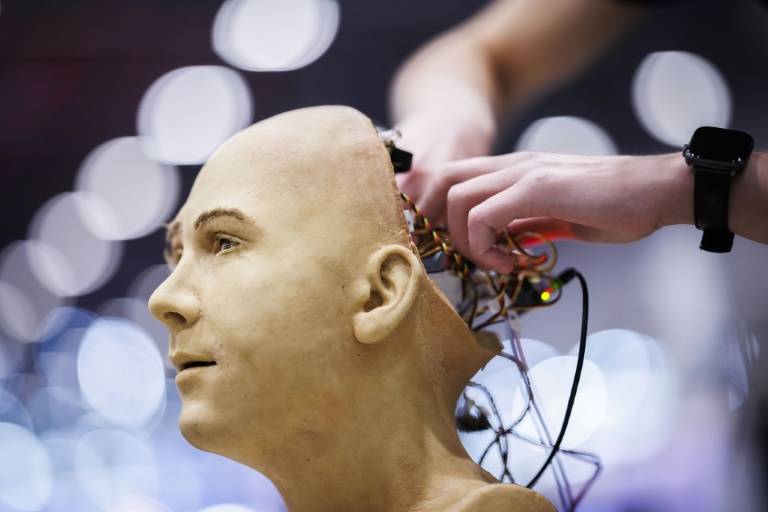Science
Study Reveals Seven Senses May Enhance AI and Robotics Development

Researchers at Skoltech have proposed a groundbreaking concept suggesting that humans may operate with seven senses. This idea stems from a newly developed mathematical model of memory, which explores the encoding and storage of information. The findings indicate that both human cognition and artificial intelligence (AI) could significantly benefit from broader sensory inputs to enhance learning and memory retrieval.
The research, published in the journal Scientific Reports in March 2024, posits that memory functions optimally within a seven-dimensional conceptual framework. According to lead researcher Nikolay Brilliantov, the model reveals that when each memory—referred to as an “engram”—is characterized by seven distinct features, the capacity for retaining unique concepts is maximized.
Understanding Engrams and Their Evolution
Engrams represent the fundamental units of memory, comprised of a specific collection of neurons that activate together in response to stimuli. Each engram corresponds to a concept, encapsulated through various sensory attributes. For instance, the concept of a banana encompasses its appearance, aroma, taste, and texture. This multi-faceted representation categorizes the banana as a five-dimensional object within the vast expanse of human memory.
The study emphasizes that engrams undergo evolution over time, becoming more defined or blurred based on the frequency of sensory interactions with the environment. This evolution illustrates the dynamic nature of learning and forgetting as individuals engage with the world around them.
Brilliantov explains, “We have mathematically demonstrated that the engrams in the conceptual space tend to evolve toward a steady state. After a transient period, a ‘mature’ distribution of engrams emerges, which then persists in time.” This steady state leads to the conclusion that the number of distinct engrams is greatest when operating within a seven-dimensional conceptual space.
The Implications for AI and Robotics
The implications of this research are profound. By establishing that seven is the optimal number of senses, the study suggests that a more comprehensive understanding of the world can be achieved through enhanced sensory input. This insight could significantly impact the development of AI and robotic systems, optimizing their capacity for learning and memory.
Brilliantov further notes that this conclusion is not merely a product of the model’s specifics; instead, the persistence of the number seven indicates a fundamental characteristic of memory engrams. It is also important to acknowledge that overlapping engrams representing similar concepts may be treated as a single entity when assessing memory capacity.
The research into memory and cognition is crucial not only for AI development but also for advancing our understanding of human consciousness. As researchers continue to explore these theoretical models, they may unlock new avenues for recreating human-like memory in AI agents.
This innovative approach to memory has the potential to transform how we perceive cognition, both in biological entities and artificial systems. As scientists delve deeper into the mechanics of memory, the future could bring forth enhanced AI capabilities, bridging the gap between human and machine intelligence.
-

 Education3 months ago
Education3 months agoBrandon University’s Failed $5 Million Project Sparks Oversight Review
-

 Science4 months ago
Science4 months agoMicrosoft Confirms U.S. Law Overrules Canadian Data Sovereignty
-

 Lifestyle3 months ago
Lifestyle3 months agoWinnipeg Celebrates Culinary Creativity During Le Burger Week 2025
-

 Health4 months ago
Health4 months agoMontreal’s Groupe Marcelle Leads Canadian Cosmetic Industry Growth
-

 Science4 months ago
Science4 months agoTech Innovator Amandipp Singh Transforms Hiring for Disabled
-

 Technology3 months ago
Technology3 months agoDragon Ball: Sparking! Zero Launching on Switch and Switch 2 This November
-

 Education3 months ago
Education3 months agoRed River College Launches New Programs to Address Industry Needs
-

 Technology4 months ago
Technology4 months agoGoogle Pixel 10 Pro Fold Specs Unveiled Ahead of Launch
-

 Business3 months ago
Business3 months agoRocket Lab Reports Strong Q2 2025 Revenue Growth and Future Plans
-

 Technology2 months ago
Technology2 months agoDiscord Faces Serious Security Breach Affecting Millions
-

 Education3 months ago
Education3 months agoAlberta Teachers’ Strike: Potential Impacts on Students and Families
-

 Science3 months ago
Science3 months agoChina’s Wukong Spacesuit Sets New Standard for AI in Space
-

 Education3 months ago
Education3 months agoNew SĆIȺNEW̱ SṮEȽIṮḴEȽ Elementary Opens in Langford for 2025/2026 Year
-

 Technology4 months ago
Technology4 months agoWorld of Warcraft Players Buzz Over 19-Quest Bee Challenge
-

 Business4 months ago
Business4 months agoNew Estimates Reveal ChatGPT-5 Energy Use Could Soar
-

 Business3 months ago
Business3 months agoDawson City Residents Rally Around Buy Canadian Movement
-

 Technology2 months ago
Technology2 months agoHuawei MatePad 12X Redefines Tablet Experience for Professionals
-

 Business3 months ago
Business3 months agoBNA Brewing to Open New Bowling Alley in Downtown Penticton
-

 Technology4 months ago
Technology4 months agoFuture Entertainment Launches DDoD with Gameplay Trailer Showcase
-

 Technology4 months ago
Technology4 months agoGlobal Launch of Ragnarok M: Classic Set for September 3, 2025
-

 Technology4 months ago
Technology4 months agoInnovative 140W GaN Travel Adapter Combines Power and Convenience
-

 Science4 months ago
Science4 months agoXi Labs Innovates with New AI Operating System Set for 2025 Launch
-

 Top Stories2 months ago
Top Stories2 months agoBlue Jays Shift José Berríos to Bullpen Ahead of Playoffs
-

 Technology4 months ago
Technology4 months agoNew IDR01 Smart Ring Offers Advanced Sports Tracking for $169










